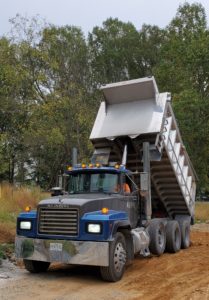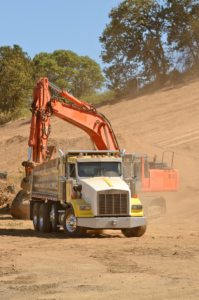The Ultimate Guide to Dump Truck Hauling: Tips, Tricks, and Safety Measures
Are you considering dump truck hauling for your construction or landscaping projects? Look no further than our comprehensive guide that will take you through everything you need to know about this essential transportation method. From tips and tricks to safety measures, we’ve got you covered.
Whether you’re a seasoned professional or a newbie, this ultimate guide will help you navigate the ins and outs of dump truck hauling. Discover how to choose the right truck for your needs, master the art of loading and unloading materials efficiently, and ensure the safety of both your crew and the public during transports.
With our expert advice and practical tips, you’ll be able to optimize your hauling operations, saving time and money in the process. From understanding weight limits and legal requirements to maximizing payload capacity, our guide is a one-stop resource for all things dump truck hauling.
Don’t miss out on this invaluable resource that will empower you to make the most of dump truck hauling. Let’s get started on your journey toward efficient and safe transportation.
Types of Dump Trucks Used in Hauling
Dump trucks come in various sizes and configurations, each designed for specific hauling tasks. Understanding the different types available can help you choose the right truck for your needs.
- Standard Dump Trucks: These trucks feature a hydraulic system that allows the bed to tilt and dump the load. They are commonly used for transporting loose materials such as gravel, sand, or dirt.
- Transfer Dump Trucks: Transfer dump trucks, also known as slam-bang trucks, have separate trailers that can be detached from the main truck. This design enables them to transport more material and unload it quickly in a specific location.
- Semi-Trailer Dump Trucks: These trucks consist of a tractor unit pulling a separate trailer with a hydraulic lift. They are suitable for heavy hauling and are commonly used in construction sites and large-scale projects.
- Articulated Dump Trucks: Articulated dump trucks are ideal for off-road hauling. They have a pivot point between the cab and the bed, which allows for increased maneuverability on rough terrain.
- Super Dump Trucks: Super dump trucks, also known as Super 10s, are equipped with additional axles that can be raised or lowered. This feature enables them to carry heavier loads while still complying with weight regulations.
- Side Dump Trucks: Side dump trucks have a hydraulic bed that can tilt to the side, allowing for efficient unloading. They are commonly used in situations where access to the rear is limited or where there is a need to unload on one side.
By understanding the different types of dump trucks available, you can select the one that best suits your specific hauling requirements. Consider factors such as the type of material you will be transporting, the terrain you will be operating on, and any weight restrictions or regulations that may apply. Now that we’ve covered the types of dump trucks, let’s move on to the hauling process.
Dump Truck Hauling Process
Dump truck hauling involves a series of steps that ensure the efficient and safe transportation of materials. By following these steps, you can minimize the risk of accidents, maximize payload capacity, and streamline your operations.
- Preparing the Truck: Before starting any hauling job, it’s crucial to inspect the truck and ensure it is in proper working condition. Check the tires, brakes, lights, and hydraulic system to minimize the risk of breakdowns or malfunctions during transportation.
- Loading the Materials: When loading the materials onto the truck, it’s important to distribute the weight evenly to maintain stability during transport. Overloading one side of the truck or exceeding the weight limits can result in tipping or loss of control.
- Securing the Load: Once the materials are loaded, secure them properly to prevent shifting or falling off during transit. Use tarps, straps, or chains to secure the load and ensure it is contained within the truck bed.
- Driving Safely: Safe driving is crucial when operating a dump truck. Observe speed limits, maintain a safe distance from other vehicles, and use signals and mirrors to indicate your intentions. Be aware of blind spots and always check for clearance before dumping the load.
- Unloading the Materials: When it’s time to unload, find a designated dumping area or a location that complies with local regulations. Ensure there are no overhead power lines, structures, or people in the vicinity before tilting the truck bed to dump the load.
- Returning for Another Load: After unloading, inspect the truck for any damage or issues that need immediate attention. If everything is in order, return to the loading site for another load and repeat the process.
By following these steps and adhering to safety protocols, you can ensure a smooth and efficient dump truck hauling process. However, it’s essential to implement additional safety measures to protect both your crew and the public during transports.
Safety Measures for Dump Truck Hauling
Dump truck hauling involves inherent risks, both on and off the road. Implementing safety measures is crucial to prevent accidents, injuries, and property damage. Here are some key safety measures to consider:
- Driver Training and Certification: Ensure that all dump truck drivers undergo proper training and possess the necessary certifications. This includes training in defensive driving, load securement, and emergency procedures.
- Regular Vehicle Inspections: Conduct regular inspections of the dump trucks to identify any maintenance or repair needs. Check the brakes, lights, tires, and hydraulic system to ensure they are in good working condition.
- Load Securement: Properly secure the load using appropriate methods such as tarps, straps, or chains. Regularly check the load during transit to ensure it remains secure and balanced.
- Personal Protective Equipment (PPE): Provide all crew members with the necessary PPE, including high-visibility vests, hard hats, and safety boots. This will help protect them from potential hazards on the job site.
- Traffic Control Measures: Implement traffic control measures, such as signage, barricades, and flaggers, to ensure the safety of both your crew and the public. Clearly mark dump truck zones and establish clear communication channels.
- Regular Maintenance and Repairs: Stick to a strict maintenance schedule for your dump trucks to address any potential issues before they become major problems. Regularly inspect and maintain the hydraulic system, brakes, tires, and other critical components.
- Emergency Preparedness: Develop and communicate emergency procedures to all crew members. This includes procedures for accidents, spills, and breakdowns. Ensure that all crew members know how to respond in case of an emergency.
By implementing these safety measures and creating a culture of safety within your organization, you can significantly reduce the risks associated with dump truck hauling. However, successful hauling goes beyond safety measures alone. Here are some tips to optimize your dump truck hauling operations.
Dump Truck Insurance
Dump truck insurance is vital for protecting your business against potential risks and liabilities. Firstly, it covers damages from accidents, ensuring financial security. Additionally, this insurance supports legal compliance, keeping your operations on the right side of regulations. Moreover, it safeguards against theft and vandalism, providing peace of mind. Importantly, having insurance enhances your company’s credibility with clients, proving your commitment to safety and responsibility. Hence, securing comprehensive dump truck insurance is a crucial step for any operator in the industry.
Tips for Successful Dump Truck Hauling
Dump truck hauling requires careful planning and execution to ensure efficiency and profitability. Here are some tips to help you make the most of your hauling operations:
- Plan Efficient Routes: Plan your routes in advance to minimize travel time and fuel consumption. Consider factors such as traffic patterns, road conditions, and potential detours. Avoid congested areas and plan for alternative routes if needed.
- Optimize Load Capacity: Maximize your payload capacity by properly loading and distributing the materials. Be mindful of weight restrictions and legal requirements to avoid fines and penalties. Optimize the load to minimize empty trips and maximize efficiency.
- Invest in Technology: Embrace technology to streamline your operations. Use GPS tracking systems to monitor vehicle locations and optimize routing. Implement fleet management software to track maintenance schedules, fuel consumption, and driver performance.
- Communicate Effectively: Establish clear communication channels between the driver, crew members, and project managers. Ensure everyone is on the same page regarding load requirements, delivery schedules, and any changes in plans.
- Monitor Fuel Consumption: Keep track of fuel consumption and implement measures to reduce fuel costs. Encourage drivers to adopt fuel-efficient driving techniques, such as avoiding excessive idling and maintaining steady speeds.
- Streamline Loading and Unloading: Optimize the loading and unloading process to minimize downtime. Ensure there are designated loading and dumping areas that are easily accessible and well-maintained.
- Regular Training and Feedback: Provide ongoing training and feedback to your drivers and crew members. Keep them updated on the latest industry practices, safety guidelines, and best hauling practices.
By implementing these tips, you can optimize your dump truck hauling operations and improve overall efficiency. However, it’s essential to address the maintenance and care of your dump trucks to ensure their longevity and reliability.
Maintenance and Care for Dump Trucks
Proper maintenance and care are essential to keep your dump trucks in optimal working condition. Regular maintenance not only extends the lifespan of your vehicles but also minimizes the risk of breakdowns and improves overall safety. Here are some key maintenance practices to consider:
- Regular Inspections: Conduct routine inspections of your dump trucks to identify any potential issues. Check the brakes, tires, lights, hydraulic system, and other critical components. Address any problems promptly to prevent them from escalating.
- Fluid Checks and Changes: Regularly check and change the fluids in your dump trucks, including engine oil, transmission fluid, and coolant. Follow the manufacturer’s recommendations for fluid types and change intervals.
- Tire Maintenance: Inspect the tires regularly for wear and tear. Check the tire pressure and ensure it is within the recommended range. Rotate the tires periodically to ensure even wear.
- Lubrication: Keep all moving parts properly lubricated to reduce friction and prevent premature wear. Lubricate hinges, pivots, and other components as recommended by the manufacturer.
- Cleanliness: Keep the dump trucks clean, both inside and out. Regularly wash the exterior to remove dirt and debris that can cause corrosion. Clean the interior to remove any loose material that may affect the hydraulics.
- Electrical System Maintenance: Inspect the electrical system, including lights, switches, and wiring, to ensure proper functioning. Repair or replace any damaged or faulty components.
- Documentation and Record-Keeping: Maintain detailed records of all maintenance and repairs performed on your dump trucks. This will help you track the history of each vehicle and identify any recurring issues.
By following these maintenance practices and addressing any issues promptly, you can ensure the longevity and reliability of your dump trucks. However, it’s important to be aware of the challenges that may arise in dump truck hauling and find effective solutions.
Challenges and Solutions in Dump Truck Hauling
Dump truck hauling comes with its fair share of challenges. By understanding these challenges and finding effective solutions, you can overcome them and optimize your hauling operations. Here are some common challenges and their corresponding solutions:
- Road Conditions: Poor road conditions, such as uneven surfaces or muddy terrain, can pose challenges during hauling. Choose appropriate dump trucks that can handle off-road conditions. Adjust driving techniques to maintain control and minimize the risk of accidents.
- Traffic Congestion: Heavy traffic can significantly impact hauling efficiency. Plan your routes to avoid peak traffic hours and congestion-prone areas. Utilize real-time traffic updates to make informed decisions and adjust routes accordingly.
- Weather Conditions: Adverse weather conditions, such as rain, snow, or strong winds, can affect hauling operations. Monitor weather forecasts and plan accordingly. Consider rescheduling or modifying routes to ensure the safety of your crew and the materials being transported.
- Environmental Concerns: Dump truck hauling can have environmental implications, such as air and noise pollution. Take measures to mitigate these impacts, such as using fuel-efficient vehicles, adhering to emission standards, and minimizing idling time.
- Cost Management: Managing costs is crucial for the profitability of your hauling operations. Monitor fuel consumption, optimize routes, and implement fuel-saving measures. Regularly review maintenance and repair costs to identify areas for improvement.
- Driver Retention: Finding and retaining skilled dump truck drivers can be a challenge. Offer competitive compensation packages and provide ongoing training and support to attract and retain qualified drivers. Keep an open line of communication with your drivers to address any concerns or issues promptly.
By implementing these solutions, you can overcome the challenges associated with dump truck hauling and ensure the smooth operation of your business. However, it’s important to be aware of the regulations and permits that govern this transportation method.
Dump Truck Hauling Regulations and Permits
Dump truck hauling is subject to various regulations and permits to ensure safety, compliance, and environmental protection. Familiarize yourself with the following regulations and obtain the necessary permits before embarking on any hauling projects:
- Weight Restrictions: Each jurisdiction has specific weight limits for dump trucks. Ensure your vehicles comply with these weight restrictions to avoid fines and penalties. Regularly check and calibrate weighing systems to maintain accuracy.
- Height and Width Restrictions: Some areas may have restrictions on the height and width of vehicles allowed on certain roads or bridges. Be aware of these restrictions and plan your routes accordingly to avoid any conflicts.
- Hours of Service: Dump truck drivers must adhere to hours-of-service regulations to prevent driver fatigue and ensure road safety. Familiarize yourself with these regulations and implement appropriate scheduling and rest periods for your drivers.
- Hazardous Materials: If you are hauling hazardous materials, additional permits and certifications may be required. Ensure compliance with all applicable regulations and provide proper training to drivers handling hazardous materials.
- Environmental Regulations: Dump truck hauling can have environmental impacts, especially when transporting loose materials. Take measures to prevent spillage and implement best practices for dust control. Adhere to all environmental regulations and obtain necessary permits for waste disposal if applicable.
- Local Permits: Depending on the jurisdiction, you may need specific permits to operate dump trucks within certain areas. Research and obtain the necessary local permits to avoid legal issues and ensure smooth operations.
Maximizing Payload Capacity for Efficient Hauling
To optimize your dump truck hauling operations, focus on maximizing payload capacity while adhering to legal weight limits. Distribute the load evenly to prevent tipping and enhance stability during transport. Regularly calibrate weighing systems to ensure accuracy and avoid overloading, which can lead to fines or accidents.
Conclusion
In conclusion, mastering dump truck hauling is crucial for efficient, safe, and compliant construction or landscaping projects. From choosing the right dump truck to managing loads and adhering to regulations, this guide equips you with essential knowledge. However, success also hinges on partnering with the right service provider.
For top-notch dump truck hauling services in Maryland, Virginia, and Washington DC, consider Dirt Connections. Our experienced team is ready to deliver expert service tailored to your project’s unique needs. Contact Dirt Connections today; let us turn your construction dreams into reality with professionalism and efficiency.
Summary

Dirt Connections was started with one goal in mind: providing quality residential and commercial construction services to clients on time and on budget. Reach out for more information on how we can support your next project.
For your convenience our estimates are free and by appointment. Call 703-940-9949 for a free estimate today!












































